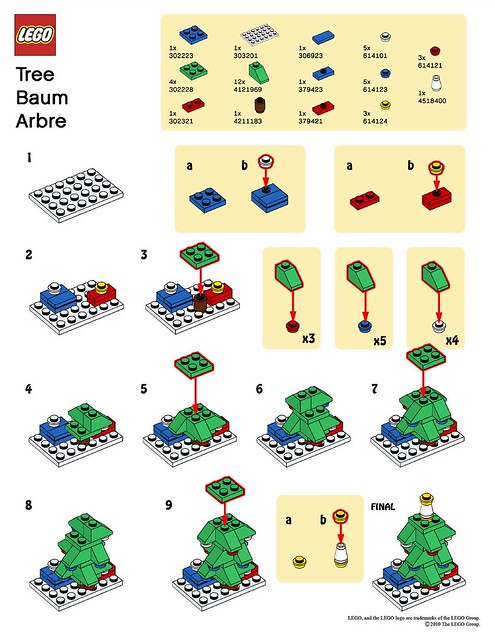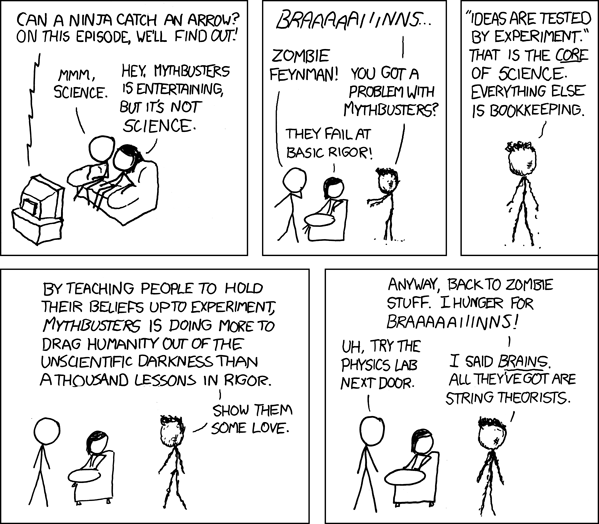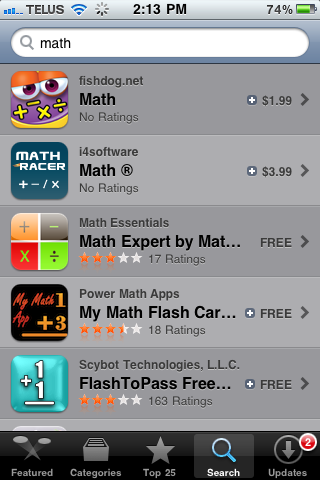The CBC just ran an article on the problems in our current math system which was terribly one-sided and an example of the worst kind of fear-mongering journalism. They are quoting an article by Michael Zwaagstra, an "educational expert" writing on behalf of the Frontier Centre for Public Policy.
First, let’s examine the article written by Zwaagstra.
A solid understanding of mathematics, also known as numeracy, is an important component of a well-rounded education. The ability to perform basic mathematical computations is a requirement of many entry-level jobs. In addition, careers in fields such as engineering, medicine, finance and all of the sciences require a solid background in higher-level university mathematics, including calculus, statistics and linear algebra.
The first thing to point out here is that the basic mathematical computations … for entry level jobs are much different than the higher-level university level mathematics needed for engineering, medicine, finance, and the sciences.
I have to agree with Zwaagstra that a solid understanding of mathematics is an important component of a well-rounded education, but his assertion that mathematics equals numeracy is definitely false, as I have had pointed out to me on a regular basis. There are many mathematicians, engineers, doctors, economics, and scientistis who struggle with basic computational math, but are fully capable of doing higher level mathematics, and this has been true for a long time; far longer than the new math has been used in schools.
Because math is such an important skill, schools have an obligation to ensure that students learn key math concepts. Unfortunately, schools are largely failing in this regard. First-year post-secondary students are increasingly unprepared for university-level mathematics, and this has led to a proliferation of remedial math courses at universities across Canada. Many parents choose to enroll their children in special tutoring sessions with organizations such as Kumon and the Sylvan Learning Centre to fill in the gaps left by the public school system. Unfortunately, many cannot afford extra tutoring, and this creates a two-tiered system that unfairly penalizes children whose parents cannot pay for extra math lessons.
Now Zwaagstra points out that remedial math courses are on the rise in universities, but he doesn’t mention a couple of key facts. First, under the old system of mathematics instruction, around 50% of students failed first year math courses, which were often included in programs as a tool with which to weed people out of university. Could it be that this issue has always been around, and universities are simply now doing something about the problem? What about the increase in students seeking a university education? Could these two issues be connected? Zwaagstra has assumed a correlation between the number of remedial math courses, and the effectiveness of k-12 math education, without actually finding research which supports his conclusion.
Further, he talks about parents enrolling their kids in after school tutoring programs without discussing the reasons why parents are doing this? Are parents increasingly enrolling their kids for extra tutoring because they are dissatisfied with their kids current educational attainment? Or do they have other reasons for paying for these tutoring services? We don’t know, and Zwaagstra doesn’t provide us with any evidence for the reasons for parents to choose tutoring, he just cherry-picks this fact because it seems to support his argument.
Although there is solid evidence supporting the traditional approaches to teaching math that involve mastering standard algorithms, practising skills to mastery and introducing concepts in incremental steps, most provincial math curricula and textbooks employ a different approach. Constructivism, which encourages students to come up with their own understanding of the subject at hand, is the basis for this new approach to teaching math. As a result, there is very little direct instruction of important mathematics algorithms or rigorous practising and memorization of basic math facts.
There is also solid evidence showing that the longer that people are out of school, the less likely they are to use the algorithms they use in school, but the more successful they are at solving mathematical problems they encounter, as Keith Devlin points out in his book, The Math Instinct. In other words, traditional school math seems to be a hindrance to people being able to actually solve real world mathematical problems. It’s worth pointing out that Devlin’s research is reasonably old, and most of the participants in the research learned mathematics in the traditional method. Is it even worth pointing out that Zwaagstra doesn’t actually include any of the solid evidence in his paper, and the footnote here (see the original article) leads to a definition of the word algorithm?
Our students deserve better. Pupils who are not taught math properly are being unfairly denied the opportunity to enter careers in many desirable fields. The public school system has an obligation to ensure that every child has the opportunity to learn the mathematics required for university-level mathematics courses.
It’s pretty important to note that the new math is not being taught evenly, and that when teachers are given proper training in how to use the new math materials, their students’ understanding improves. To say that the problems in our math education system are entirely due to the introduction of the new math curriculum, is pretty irresponsible, given that any number of other factors could be contributing to the problem. Further, many schools use the International Baccalaureate program, which itself relies on the "new math" with a focus on students understanding mathematics and being able to communicate their understanding and these students are highly sought after by universities. If the new math was so destructive, wouldn’t we see these students being turned away by universities in the sciences?
Zwaagstra then goes on to bash the results of the PISA examinations, citing an article (claiming it is research) written that suggests that Finnish students are not as good at math as the PISA results would claim, and that by extension, neither are Canadian students.
There is a strong consensus [emphasis mine] among math professors that the math skills of these students are much weaker than they were two or three decades ago.
Zwaagstra links to two articles (neither of which is a research study) that state that some professors have found a drop in numeracy skills (again, these are associated with mathematical ability, but are not equivalent), and the other of which makes no mention of math skills at all. In this case, Zwaagstra is completely misrepresenting the articles themselves. He then points to two professors who have done research on the computational abilities of graduates and noticed a decline, but he does not clarify whether or not this is correlated with a decline in their ability to do university level mathematics.
Zwaagstra continues by bemoaning the lack of standards and emphasis on accurate calculations by the National Council of Mathematics Teachers (NCTM) and the Western and Northern Canadian Protocol (WNCP). Clearly the research these two organizations have done for decades is not sufficient for Zwaagstra, especially considering Zwaagstra’s credentials (Hint: He’s never been a math teacher, nor has he any credentialed expertise in mathematics education Update: Apparently, Zwaagstra spent 7 years as a middle school math teacher, so I’m retracting at least this part of my response).
However, there is a big difference between demonstrating a conceptual understanding of mathematics and actually being able to solve equations accurately and efficiently. Just as most people would be very uncomfortable giving a driver’s licence to someone who merely demonstrates a conceptual understanding of how to drive a car, we should be concerned about a math curriculum that fails to emphasize the importance of mastering basic math skills.
To extend Zwaagstra’s analogy, we should similarly be afraid of giving the keys to someone who has no real world experience driving. If someone has spent all of their time in a flight simulator, but never actually driven a car, should they be allowed to do so? Does an emphasis on the mechanics of driving a car (or the mechanics of mathematics) turn someone into who is capable of driving a car (or able to use mathematics)?
Zwaagstra’s solution to improving math education is to move "back to basics" which is as unoriginal an idea as I’ve heard, and it is arrogant of Zwaagstra to assume that this approach hasn’t been tried before. Perhaps Zwaagstra could instead address the issue of elementary school teachers often lacking support and training in how to teach math? Zwaagstra points out (correctly) that having mastered one computation, students are then better able to learn another computation, but this leaves students learning a series of computations, and not spending any time actually using them.
JUMP math is mentioned in Zwaagstra’s article as an antidote to the problem, but he doesn’t talk about the issue of the associated training, or the lack of diverse assessment used in the JUMP math system. I think that the training manuals which go along with the JUMP math curriculum, for example, actually address the misconceptions of the people teaching the math (mostly elementary school teachers) rather than itself being a significantly better system. As one educator has told me, JUMP math is pretty useless without the training materials for teachers.
Just as someone who does not practise the piano will never learn to play well, someone who does not practise basic math skills will never become fluent in math.
Similarly, someone who has not had time to play with a piano, to improvise, and to perform music for others will never develop an appreciation for the instrument. Zwaagstra is suggesting that we should discard the extra parts of math education, like problem solving, and focus on computations, which is the musical equivalent of only learning scales, and never getting to perform music.
No one would stand for that in music education, so why should we accept it in math education?
Update: Here’s another good rebuttal to Zwaagstra’s article.







